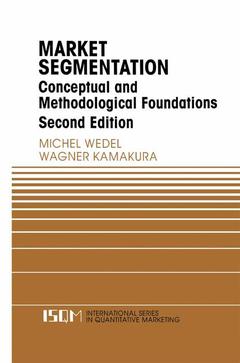Market Segmentation (2nd Ed., 2nd ed. 2000) Conceptual and Methodological Foundations International Series in Quantitative Marketing Series, Vol. 8
Langue : Anglais
Auteurs : Wedel Michel, Kamakura Wagner A.

Modern marketing techniques in industrialized countries cannot be implemented without segmentation of the potential market. Goods are no longer produced and sold without a significant consideration of customer needs combined with a recognition that these needs are heterogeneous. Since first emerging in the late 1950s, the concept of segmentation has been one of the most researched topics in the marketing literature. Segmentation has become a central topic to both the theory and practice of marketing, particularly in the recent development of finite mixture models to better identify market segments.
This second edition of Market Segmentation updates and extends the integrated examination of segmentation theory and methodology begun in the first edition. A chapter on mixture model analysis of paired comparison data has been added, together with a new chapter on the pros and cons of the mixture model. The book starts with a framework for considering the various bases and methods available for conducting segmentation studies. The second section contains a more detailed discussion of the methodology for market segmentation, from traditional clustering algorithms to more recent developments in finite mixtures and latent class models. Three types of finite mixture models are discussed in this second section: simple mixtures, mixtures of regressions and mixtures of unfolding models. The third main section is devoted to special topics in market segmentation such as joint segmentation, segmentation using tailored interviewing and segmentation with structural equation models. The fourth part covers four major approaches to applied market segmentation: geo-demographic, lifestyle, response-based, and conjoint analysis. The final concluding section discusses directions for further research.
This second edition of Market Segmentation updates and extends the integrated examination of segmentation theory and methodology begun in the first edition. A chapter on mixture model analysis of paired comparison data has been added, together with a new chapter on the pros and cons of the mixture model. The book starts with a framework for considering the various bases and methods available for conducting segmentation studies. The second section contains a more detailed discussion of the methodology for market segmentation, from traditional clustering algorithms to more recent developments in finite mixtures and latent class models. Three types of finite mixture models are discussed in this second section: simple mixtures, mixtures of regressions and mixtures of unfolding models. The third main section is devoted to special topics in market segmentation such as joint segmentation, segmentation using tailored interviewing and segmentation with structural equation models. The fourth part covers four major approaches to applied market segmentation: geo-demographic, lifestyle, response-based, and conjoint analysis. The final concluding section discusses directions for further research.
Part 1: Introduction. 1. The Historical Development of the Market Segmentation Concept. 2. Segmentation Bases. 3. Segmentation Methods. 4. Tools for Market Segmentation. Part 2: Segmentation Methodology. 5. Clustering Methods. 6. Mixture Models. 7. Mixture Regression Models. 8. Mixture Unfolding Models. 9. Profiling Segments. 10. Dynamic Segmentation. Part 3: Special Topics in Market Segmentation. 11. Joint Segmentation. 12. Market Segmentation with Tailored Interviewing. 13. Model-Based Segmentation Using Structural Equation Models. 14. Segmentation Based on Product Dissimilarity Judgements. Part 4: Applied Market Segmentation. 15. General Observable Bases: Geo-demographics. 16. General Unobservable Bases: Values and Lifestyles. 17. Product-specific observable Bases: Response-based Segmentation. 18. Product-Specific Unobservable Bases: Conjoint Analysis. Part 5: Conclusions and Directions for Future Research. 19. Conclusions: Representations of Heterogeneity. 20. Directions for Future Research. References. Index.
Michel Wedel (1957) is Professor of Marketing Research at the Department of Economics, University of Groningen, The Netherlands.
Date de parution : 10-2012
Ouvrage de 382 p.
15.5x23.5 cm
Thèmes de Market Segmentation :
Mots-clés :
Market segmentation; Regression; algorithm; algorithms; calculus; marketing; model
© 2024 LAVOISIER S.A.S.


